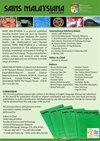虹鳟鱼和褐鳟鱼油基灭活疫苗配方及保护性免疫反应
IF 0.8
4区 综合性期刊
Q3 MULTIDISCIPLINARY SCIENCES
引用次数: 0
摘要
疾病严重阻碍了渔业和水产养殖业的发展和增长。抗击致病性疾病,尤其是细菌性疾病,至关重要。鲑鱼的疖病主要是由虹鳟和褐鳟中的沙门氏气单胞菌引起的。为了控制这种病原体,疫苗已被确定为一种重要工具。在本研究中,我们配制了一种以油为佐剂的灭活疫苗,并对其有效性进行了评估。计算ArS-Pak-19的致死剂量并腹腔注射给鱼。在特定时间采集肾、肝、脾和血液样本进行感染分析。为了评估疫苗的免疫原性,设计了一项实验。将160尾鱼分为8个水族箱,其中6个试验组和2个对照组各设1个重复,分别腹腔注射1.6 × 107、1.6 × 108和1.6 × 109疫苗,每两周采血,连续56 d计算抗体滴度。免疫后,这些组腹腔注射沙门氏菌气单胞菌(ArS-Pak-19)。感染后第7天,出现在肝、脾、肾。在攻毒后30天估计对照组的相对存活率。相对存活率为80%。免疫后24天IgM滴度较高。我们还分析了抗体与沙门氏菌气单胞菌a层的非特异性结合。这项研究的发现提供了接种疫苗提高鱼类免疫力的证据,并为进一步的疫苗接种行动提供了路线图。本文章由计算机程序翻译,如有差异,请以英文原文为准。
Oil Based Inactivated Vaccine Formulation for Furunculosis (A. salmonicida) and Protective Immune Response of Rainbow Trout and Brown Trout
The development and growth of the fisheries and aquaculture industries are significantly hampered by illnesses. It is critical to combat pathogenic illnesses, especially bacterial ones. Furunculosis in salmon is mostly brought on by Aeromonas salmonicida in rainbow and brown trout. To control this pathogen, vaccines have been identified as a significant tool. In the present study, we have formulated an inactivated vaccine with oil as an adjuvant and estimated its efficacy. The lethal dose of ArS-Pak-19, was calculated and injected intraperitoneally to the fishes. To analyze the infection, samples of kidney, liver, spleen, and blood were collected at specific times. To estimate the immunogenicity of the vaccine, an experiment was designed. One hundred sixty fishes were distributed into 8 tanks including, six experimental groups and two control groups with its replicates, vaccines injected intraperitoneally 1.6 × 107, 1.6 × 108, and 1.6 × 109 and blood samples were taken fortnightly for 56 days to calculate the antibodies titers. After immunization these groups were challenged with Aeromonas salmonicida (ArS-Pak-19) intraperitoneally. At 7th day of post infection, it appeared in the liver, spleen, and kidney. The relative percentage of survival was estimated with control groups at 30 days after challenge. The relative percentage of survival was 80%. The IgM titers were higher at 24 days of post immunization. We also analyzed that antibodies non-specifically bound with the A-layer of Aeromonas salmonicida. The findings of this study offer evidence that vaccinations boost fishes immunity and serve as a roadmap to further vaccination initiatives.
求助全文
通过发布文献求助,成功后即可免费获取论文全文。
去求助
来源期刊

Sains Malaysiana
MULTIDISCIPLINARY SCIENCES-
CiteScore
1.60
自引率
12.50%
发文量
196
审稿时长
3-6 weeks
期刊介绍:
Sains Malaysiana is a refereed journal committed to the advancement of scholarly knowledge and research findings of the several branches of science and technology. It contains articles on Earth Sciences, Health Sciences, Life Sciences, Mathematical Sciences and Physical Sciences. The journal publishes articles, reviews, and research notes whose content and approach are of interest to a wide range of scholars. Sains Malaysiana is published by the UKM Press an its autonomous Editorial Board are drawn from the Faculty of Science and Technology, Universiti Kebangsaan Malaysia. In addition, distinguished scholars from local and foreign universities are appointed to serve as advisory board members and referees.
 求助内容:
求助内容: 应助结果提醒方式:
应助结果提醒方式:


